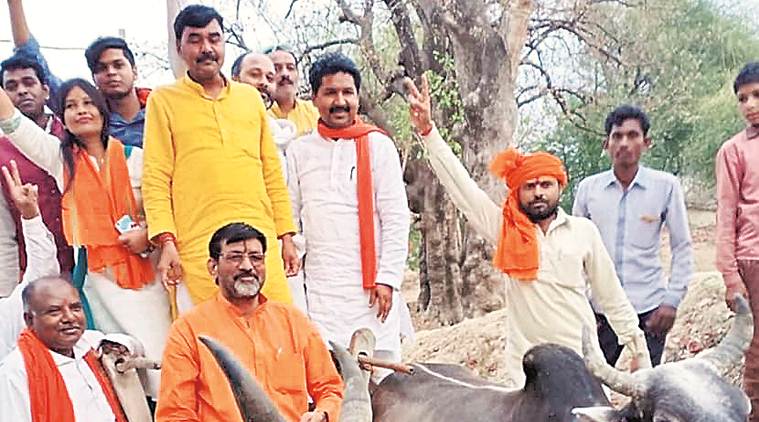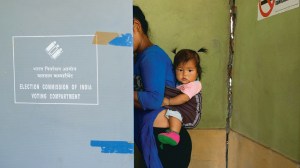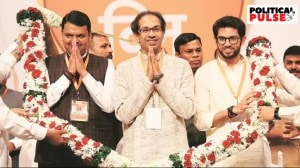- India
- International
Lok Sabha Elections 2019: Arid Chitrakoot fertile for ‘Superman, Saviour’
Chitrakoot, denuded of political norms and institutions that can be found at least in bare form, if not in substance, elsewhere, seems to provide the perfect setting for the politics of the Saviour and the Superhero that lies at the heart of the well-endowed Narendra Modi campaign.
 R K Singh Patel was earlier with the BSP for about 16 years, joined the SP after the BSP denied him a ticket, became an SP MP in 2009, walked back into the BSP after the SP also denied him a ticket in 2014, lost in the Modi wave, and is fighting this election as the BJP candidate. (Express photo)
R K Singh Patel was earlier with the BSP for about 16 years, joined the SP after the BSP denied him a ticket, became an SP MP in 2009, walked back into the BSP after the SP also denied him a ticket in 2014, lost in the Modi wave, and is fighting this election as the BJP candidate. (Express photo)
Starring in this election in Banda-Chitrakoot, which goes to polls Monday: Candidates of the BJP, Mahagathbandhan and Congress, each of whom has changed parties; a dead dacoit, Shiv Kumar Patel alias Dadua, whose legend overhangs the fray and whose brother is the Congress candidate.
And at least four minor dacoits, carrying cash rewards on their heads and trying to establish their writ, especially in the villages that border the jungles in this sparsely populated rocky terrain.
Lok Sabha Elections 2019 | Polling schedule, results date, constituency-wise results, how to check live counting
Chitrakoot, which straddles the border between UP and MP, is a no-government’s land with a claim to holy fame — it is believed that Lord Ram spent more than 12 years of his 14-year vanvas (exile) here.
In 2014, this region voted overwhelmingly for change — the Modi BJP took all four Lok Sabha seats of Bundelkhand, and in the 2017 Vidhan Sabha polls, all its 19 seats. In 2019, the pushback from the Mahagathbandhan of the SP and BSP, visible elsewhere in the state, is less tangible in Chitrakoot.

Read | In town of defence forces, job issue jostles with Pulwama
Chitrakoot, denuded of political norms and institutions that can be found at least in bare form, if not in substance, elsewhere, seems to provide the perfect setting for the politics of the Saviour and the Superhero that lies at the heart of the well-endowed Narendra Modi campaign.
“Maine kaha, ticket gaya toh main bhi gaya (I said, if you don’t give me the ticket, I go),” says Shyama Charan Gupta, the SP’s candidate from the Mahagathbandhan, explaining why he switched sides, from the BJP, on election-eve.
This is not the first time in the SP for Gupta, a leading businessman — he had joined the BJP in 2014 after 16 years in the SP because “SP ne ticket kaat diya (SP denied me a ticket)”.
In earlier elections, alleges Gupta, dacoit Dadua campaigned for the present BJP candidate R K Singh Patel — “woh Patel aur woh Patel (because both are Patels),” he says. The BJP, he claims, is wooing dacoit Babli Kol in this election.
Also read | In dry heart of India, Elections 2019 is all about water
After Dadua’s death in an encounter by the STF in 2007, Babli Kol is competing with other gang leaders — Gauri Yadav, Lovelesh Kol and Raja Yadav — to take his place.
The story goes that the dacoit rose in this arid landscape in reaction to the oppression unleashed by big landlords known as “daddus”. Sometime in the 1980s, the bandit began to aspire to be king, not just kingmaker. Dadua and his gang started putting up their own candidates in elections in the 1990s. The winnability of SP and BSP in that decade in this region is also seen to have been shored up by the force of the outlaw.
“Even today, it’s not just the people, but also the police that fears the dacoits,” says Gupta.
The home-office of R K Singh Patel, the BJP candidate, offers tell-tale glimpses of his own journey across parties — on the walls, a photo of him being sworn into the Mayawati ministry, a group portrait in Parliament in which he features as an SP MP, a souvenir of the Maha Kumbh.
Patel was with the BSP for about 16 years, joined the SP after the BSP denied him a ticket, became an SP MP in 2009, walked back into the BSP after the SP also denied him a ticket in 2014, lost in the Modi wave, and is fighting this election as the BJP candidate.
Patel denies accusations of patronage by and of Dadua: “My name was only joined to his because we belong to the same caste. I did, however, help his relatives, like his son Vir Singh (currently SP candidate from Khajuraho) and brother Bal Kumar (Congress candidate from Banda-Chitrakoot), and for that, I was slapped with cases of dasyu sanrakshan (patronising the bandit)”.
The third leading contender in the 2019 fray is Dadua’s brother, Bal Kumar Patel, Congress candidate. Seven cases of “dasyu sanrakshan” against him stand withdrawn by government. In between late night campaign stops, he speaks to The Indian Express: “And why would I need to take Dadua’s name? I am his brother, everyone knows that. My brother was not a dacoit, but a messiah for the poor. It was because of his patronage, that both my rivals became MPs”.
Bal Kumar began with the BSP, switched to the SP and left it to join the Congress on the eve of this election.
In Banda-Chitrakoot, then, as leaders switch parties, proclaim commitment only to getting the ticket to fight the next election, and accuse each other of patronising and being patronised by the bandit, politics turns an unseeing eye to the issues that affect people’s lives, more than in other places.
Gaya Prasad, known as “Gopal bhai”, founder of the Akhil Bharatiya Samaj Sewa Sansthan, which worked against bonded labour by the Kols (forest dwellers who call themselves Adivasi but are classified in UP as SC), says: “Bonded labour has changed its form. Now there is forced migration on false promises to brick kilns in Meerut, Delhi, Punjab and Haryana. Of those who don’t return, many are women. There is police oppression of the Kols in the name of fighting the dacoit”.
In this election, the Modi BJP is making strenuous efforts to repeat its performance of 2014 and 2017 by again seizing the vacuum created by the long-running de-institutionalisation here, presided over, alternately, by the SP and BSP.
The Modi campaign does this, first, by projecting him as saviour and “national security” as an issue larger than the sum of voter discontents.
In the Goswami Tulsidas Degree College, where students talk of unfulfilled promises of all parties, their complicities with dacoits, and most of all, of missing jobs, many more say “rashtra suraksha (national security)” is above “rozgar (jobs)” than vice versa.
For those not fully persuaded by the national security pitch, the Modi campaign has another strategy — the conversion of the citizen into the “labharthi”, the self-conscious beneficiary of government schemes.
The Modi government takes credit for a plethora of schemes, from Ujjwala gas to the toilet to opening of jan dhan accounts and the delivery of the first payment of Rs 2,000 under PM-Kisan. But it does more than just that.
Chandrika Prasad Upadhyay, made the party’s district president a year ahead of polls, says an important organisational measure was to set up a “Labharthi Pramukh” for every 10 booths — in charge of the party’s outreach to beneficiaries of government schemes. “It was a way of bringing the sangathan (organisation) behind the sarkar (government),” he says.
Where the BJP organisation has not reached, it would seem the (electronic) media is doing its job for it.
In Badi Madaiyan village in the rocky plateau or Patha area of Chitrakoot, where mud dwellings have no doors and where people sleep at night on wooden machans (raised platforms) to protect themselves from animals, Thakur Prasad says he has not got any benefit of any scheme. But he has seen and heard, on the “TV-baaja”, that “benefits are coming”. “They are being hijacked, it’s not Modiji’s fault,” he says. Kuch aaya, kuch baaki hai (some things have come, some are on their way), is the refrain.
Apart from Modi, the Protector, and Modi, the Benevolent, the projection of Modi as the larger-than-caste “national” figure has touched a chord in Chitrakoot.
Even though the BJP plays the caste game in its selection of local candidates, many look at Modi as Chitrakoot’s bridge to a national mainstream less circumscribed by caste. Or, at least, as an escape from the local rivalries and tyrannies the SP-BSP are identified with.
“The BSP gave the most to the poor,” says Maya Devi in Kitahana Bahilpurva. But “the Ahirs (Yadavs) tyrannised us. And now Mayawati has joined hands with them”.
Apr 19: Latest News
- 01
- 02
- 03
- 04
- 05






































